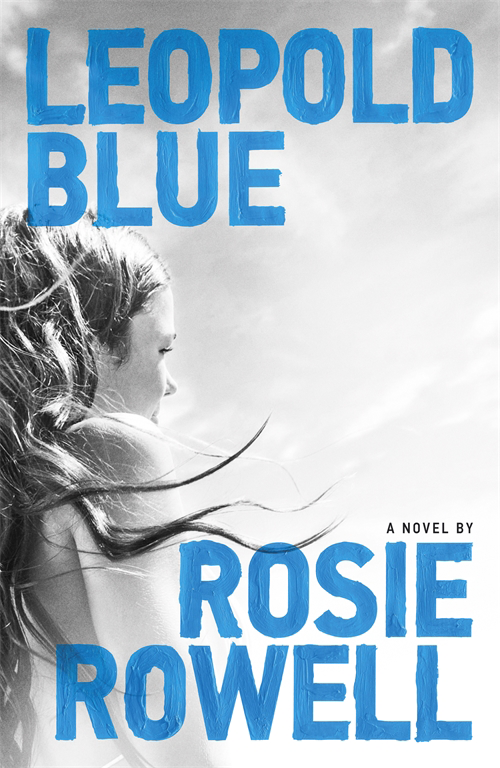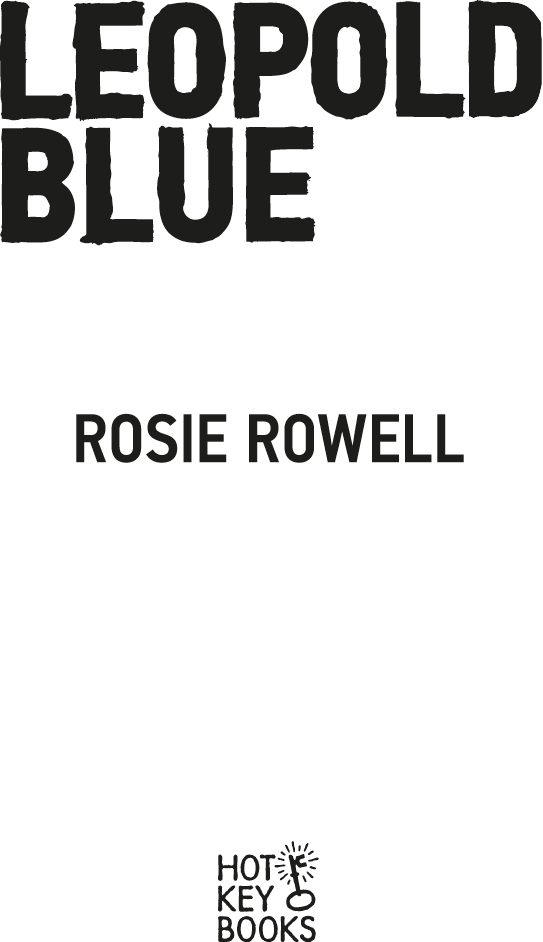Leopold Blue
Authors: Rosie Rowell


For Johnny
I lay across the middle of the Main Street. The sky above was a relentless blue. âLeopold blue' was what Mum would have said were she not off making a nuisance of herself, but she was wrong.
Leopold
blue was the deep, fiery summer sky. This was a thin-lipped, wintery version, still waiting to be pumped with the warmth of spring. I rolled my head to the side. My sister Beth sat on the edge of the pavement, her head resting on her arms. Her long brown hair curtained over her legs, the curls limp with dust. Behind her and the row of rooftops, Bosmansberg loomed, a rolling wave caught in stone.
In the last two hours there had been no evidence of life â not a human being, not a car, not even a drifting dog. Across the road Pep Stores advertised its Birthday Bonanza savings in yellow and blue. Yesterday, the last Saturday of July, the store had been bursting with farm workers on their monthly trip to town. The manager stood on the pavement with a loudspeaker and a boombox, inviting people in and laughing at his own jokes. Now the double doors were padlocked shut, an iron bar across the front. A Shoprite plastic bag humped off the pavement in a brief gust of air before settling back down.
This morning I had opened my eyes to the same noises as yesterday, in the room I had slept in all my fifteeen and a quarter years, but today my bed â with its half scratched-off My Little Pony stickers â felt too small. The purple patchwork print curtains that hung limply in my window ridiculed me.
Now, a sob slipped out, like trapped air needing to escape.
Beth lifted her head. âWhat?'
She didn't feel the choking toxicity of the air here; she didn't see that behind Bosmansberg, the rest of the world crackled and buzzed, while we remained caught in an endless empty afternoon.
âNothing.' I stood up. âI'm going home.'
âBut nothing's happened!'
âYou can't play chicken when there aren't any cars, Beth. It's pathetic.' An empty Fanta Grape can lay in front of me. I kicked it, ferociously. It
clitter-clattered
on the cement, unnaturally loud in the canyon of the Main Street.
âFine. I'm staying.' Beth lay down in my abandoned spot with the air of a South African Joan of Arc â only there was nothing at stake. Dying of boredom, perhaps.
After a few paces Beth popped up in front of me, hands curled under her armpits, flapping her arms. â
Pu-u-u-u-k-puk-puk
!' She danced about, mimicking the throaty next-door rooster.
Despite myself, I laughed.
When she had finished, overplaying the joke as usual, we started together up the middle of the road, the last two people left in the world. A banner along the white-washed wall of the old Dutch Reformed church read âLeopold Flower Show 1993'. It actually read âLeopold Flower Show 1985'; a white page with the numbers 93 had been sticky-taped over the 85.
Next to the church was the mechanics shop with its life-size cut-out of Naas Botha kicking his rugby ball into the window; and the library where tannie
[*]
Hester kept a stock of English romances for Mum, although she couldn't bear them; and the pebble-dashed Volkskas bank.
Beth stopped and sniffed the air. âCan you smell candyfloss?'
âNo,' I replied. The town smelled musty, like a left-behind suitcase. It smelled of Sunday.
âLet's make milkshakes when we get home,' she said.
Even the Royal Hotel and its adjoining off-licence were deserted today. When we reached the Anglican church, I looked towards the sprinkling of gravestones in the churchyard. In the far right-hand corner, under a jacaranda tree, were four little crosses in a row. Between 1899 and 1902 a mother had lost four children in successive years. It was the saddest corner in the world. But that was Leopold.
Beyond the church was the magistrate's office and the bronze statue of the founder of our town, Johannes Basson Leopold, standing proud and tall. Prouder and taller, apparently, than in reality, but Dad said one couldn't have one's town founded by a little runt of a man. It wasn't good for morale. The statue was a constant source of irritation to Mum, because the San bushmen were here a long time before Leopold and his ox wagons arrived, so the statue should be of a bushman. Of course bushmen weren't particularly tall either.
We passed the police station. The evil Rottweiler police dog, Kaptein, thumped his tail from his outstretched position on the front steps, but didn't bother lifting his head.
âDo you think Mum and Dad will be home when we get back?'
âI don't know, Beth.'
âDo you think she is going to do this every weekend?'
âHow should I know?' I snapped.
âI hate Sundays without her and Dad. And Ronel's mum says she is stirring up trouble.'
âWhat?'
âShe says all this talk about a deadly disease is upsetting the volk
[*]
and making the farmers angry with Mum.'
I felt a familiar thud in my stomach. âSo tell her.'
Beth shot me a look. We both knew it would only invite a long lecture about social responsibility and righting the wrongs and AIDS is a reality and education is the only way. We'd heard it too many times.
Dad blamed Mum's social conscience on her bleeding-heart, lentil-eating leftie friends in England. But I thought she was being selfish â what was the point of spending your weekends travelling the countryside, visiting desperately poor people, only to tell them about a disease that was probably going to kill them and their children? How did that improve their quality of life? It was typical of Mum; no doubt she secretly likened herself to Princess Diana, when she was simply making everyone miserable.
At the top of the Main Street we stopped and looked back down the length of the town. Nothing in this snapshot bedded us in the present. On an afternoon like this, Leopold's dead seemed more alive than the living. If, with a blink, you could shift your focus, or change the lens, what ghosts would we see crossing the street? What would they stop and say to each other?
âI've got to do a tourist brochure for English,' Beth said. She was dyslexic and not much taken with school. When she was six, Dad had asked her what she wanted to be when she grew up. She'd looked at him blankly and said, âMe.' Beth didn't need to be anything to complete her.
âFor where?' I asked.
âFor Leopold, dummy.'
âJeez.'
Only two events might entice a stranger to Leopold: the wild flower show in August, or the annual agricultural show in April. Other than that you would have to be very lost to wind up here. The town wasn't signposted â local opinion was that if you didn't know where you were you had no business being here. Mrs Franklin, the girls' school headmistress, had suggested linking the town with a Dutch equivalent, so that we could have a board that said âLeopold â twinned with Schoonvergeet
,
Holland'. This, she said, would set us apart from the handful of other hopelessly small towns of the surrounding valleys. But the locals, most of whom preferred not to leave the region, had no intention of being linked to a town full of foreigners.
âWrite about the tea,' I said, âor the veldskoen
[*]
factory that makes David Kramer's red shoes.'
âNah.' Beth wrinkled up her nose.
âOr the bushmen paintings. Or the mountain hikes.'
Beth shook her head.
âYou have to write about something.'
Beth scuffed her takkie
[*]
back and forth on the road. âI'm going to write about Dad and Mum and Simon and Marta. And you. All the people I love in this town.'
I looked at her and shook my head. I worried about Beth. She was content living here. She was happy.
Out of a rattle and a roar and a cloud of dust emerged a battered Toyota Cressida, electric blue apart from the front passenger door, which was yellow. It stopped abruptly a few metres off. Marta emerged from the canary-coloured door, in the blue and purple Mothers' Union uniform she wore to church every Sunday. She leaned back through the open passenger window and said something to the driver, who reversed and clattered away in the direction of the Camp, Leopold's name for the overcrowded streets where the coloured community lived.
âGod have mercy, children! What business do you have here?' she scolded as she walked towards us, her small body favouring her right side more than usual after a day on her feet praising the Lord.
âWe were â'
I stood on Beth's foot and said, âWe were taking a walk.'
âDon't you “taking a walk” me!' she said. Father Basil must have produced a particularly fiery sermon because Marta's crinkled black eyes looked fearsome. âLook at the sight of you, sulke skollie
[**]
children wandering the streets on a Sunday afternoon.
Wragtie
!
[***]
The shame of it. Take my hat, child,' she said, shedding her burdens, âand my coat.'
âWe're going to make milkshakes,' said Beth as we turned in the direction of home.
âYou are not!'
âBut Mum's doing her thing again. And Dad has to go with her in case she gets a puncture. So we're in charge.'
I glanced at Marta. Her lips were drawn in a disapproving line. âHow did you know where we were?' I asked her.
She clicked her tongue. âMy Father in heaven tells me everything. There are no secrets between us.'
We turned the corner and saw our house. It was a squat square with white-washed walls. Its heavy thatched roof gave the impression that it was sinking back into the ground rather than rising out of it. It was built around the remains of Leopold's original homestead and was therefore the oldest house in town. This had not impressed my English grandmother, whose house in Salisbury was only a little younger but still standing very nicely. But the most unfortunate thing about the house, according to Salisbury standards, was that it sat directly on the street. âNot that it's not much of a street,' she'd added, looking around.
With no sign of our maroon station wagon, Beth turned to Marta and squeezed her arm. âI love you, Marta!' she said, âAnd so does Meg. You'll never leave us, will you?'
âWhat?' said Marta. âI'm waiting for my Romeo and then I'm off!'
âWhere will you go?' asked Beth.
Marta turned and looked up at Bosmansberg. We were surrounded by hills. Our valley was wedged between a series of foothills that rose gradually into the actual mountains a slow hour's drive away. âSaldahna,' she answered, referring to the fishing town she grew up in. âI'll end my days sitting in a chair, watching the boats and getting fat on calamari and chips.'
I smiled and felt worse than before. When I was little I had liked to think of myself as a Georgiana (Meg was not a heroine's name), a mix of Anne of Green Gables, Nancy Drew and Queen Isabella of Spain, the protagonist of countless adventures; beautiful, steadfast and astonishingly brave. But no adventure or tragedy had come my way, nor ever would, not in Leopold â even though Leopold was a pretty tragic town. Despair hovered in doorways and oozed down telephone receivers. It formed a film over the eyes of those who had lived here forever, who would and could never leave. It was contagious. And I was Meg, not Georgiana, with my straight, muddy-brown hair and rooinek
[*]
complexion, and time was running out. Without some miraculous intervention, I was in danger of getting stuck here, being me for the rest of my life.